Identity in Eastern Promises (2007) and Gone Girl (2014)
If anything can be considered both timely and timeless, it’s identity. Loosely defined as a conception constantly created and developed by individuals in their search for self-knowledge, identity is also simultaneously universal and unique to the individual. This is a quality that arguably makes identity particularly well-suited to cinematic inquiry – and, indeed, identity has been thematically explored by film throughout cinematic history. Two contemporary films that handle identity in intriguing ways are David Cronenberg’s Eastern Promises (2007) and David Fincher’s Gone Girl (2014).
In Eastern Promises, Cronenberg introduces the viewer to the violent world of the London-based Russian mafia, as a midwife searches for answers after she finds the diary of a Russian teenager who dies in childbirth. In Gone Girl, Fincher takes the viewer on a journey from affluent New York to the “salt of the earth” Midwest and through a whirlwind of media madness, unraveling an intricate story of a woman whose disappearance prompts a heated media circus, and her husband’s efforts to simultaneously find her and survive intense scrutiny from both the press and the police.
The former is a sad tale of dreams and disillusionment that addresses issues of immigration and human trafficking; the latter is an immersive mystery that serves as an intriguing glimpse into a modern world that’s at once blatantly artificial and freakishly familiar. Although the narratives have many differences, they make for a fascinating comparison in regard to authenticity (or lack thereof), transformation, and the impact of these issues on the “real worlds” of the films.
Authentically Fake?
A large aspect of identity is the individual’s degree of authenticity. Generally, “authentic” individuals remain true to themselves, whereas “inauthentic” individuals present phony versions of themselves by “living a lie.” What constitutes authenticity in a person depends on a number of factors, not the least of which is culture. Both the London of Eastern Promises and the America of Gone Girl are predominantly individualistic cultures, which are noted for their emphasis on independence and openness, and their tendency to engage in deception for self-oriented reasons, such as personal gain.
Family Ties – with Strings Attached
In Eastern Promises, the most directly inauthentic character is Nikolai, a driver-turned-“king” for the Vory v Zakone (VvZ) and an undercover agent for the Russian Desk at Scotland Yard. Nikolai juggles these identities effectively almost to the point that both identities seem to strengthen simultaneously. He obeys Semyon and Kirill, loyally driving the car and disposing of bodies, but he also goes against them to help the midwife, Anna, along with her family, and Tatiana’s baby, Christina. A good specific example of how Nikolai manages the juggle is when Kirill orders him to have sex with one of the captive girls: He does it, but after Kirill leaves the room, he gives the girl money and ultimately enables her to escape.

Most interesting about Nikolai, however, may be that unlike typical deception in individualistic cultures, Nikolai’s actions seem largely other-oriented in that he puts his own life at risk to help Scotland Yard take down the VvZ. So while a lack of authenticity often has a negative connotation, Nikolai has compelling reasons to live his double life due to the “moral value and decency” of his efforts, thus making him seem more heroic than antagonistic.
Semyon, on the other hand, seems inauthentic both personally and symbolically as a VvZ “king.” Outwardly, he presents himself as a grandfatherly restaurateur who enjoys fine food and music and takes pride in his Russian heritage; this may all be true (or “authentic”), but he also runs an organization that takes part in, among other things, human trafficking, and he doesn’t hesitate to rape a 14-year-old girl as a kind of sick lesson for his son, Kirill, because “if you do not beat a horse, it will never be broken.”
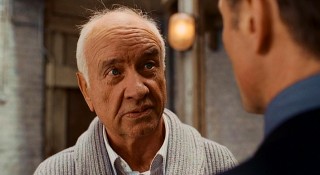
This duality between father figure and rapist, while unsettling, seems fitting, given the VvZ’s position as an organization of “brothers” that simultaneously expresses a keen interest in family ties and will kill one of its own if his presence becomes inconvenient to those with seniority. For example, the fact that Semyon invites Nikolai to join the “brotherhood,” only to set him up to be killed in Kirill’s place following the latter’s mistake, suggests that this “familial” bond is conditional and, therefore, inauthentic. Semyon’s regard for his children is similar: He protects Kirill, arguably because Kirill is male and potentially useful to the organization, but he tries to have Christina killed, seemingly because the circumstances of her birth are problematic.
“Amazing Amy Works the System”
However, a lack of personal authenticity may reach new levels with Amy Elliot in Gone Girl, who puts on multiple “acts” in her efforts to get what she wants. She plays the scared wife in a marriage gone wrong (“Diary Amy”) and the battered runaway from New Orleans (“Nancy”), as well as extensions of those characters with the public persona she presents to the police and the press after she returns home, and the “mistreated runaway” she presents to her ex, Desi, respectively.
These are fairly conventional characters, and for the most part, they go over well: The police never seem to question the sincerity of “Diary Amy,” Desi believes he knows who he’s dealing with right up until the moment Amy cuts his throat, and Amy’s public position as “America’s sweetheart” is solidified upon her return. These characters may go over well precisely because they’re conventional: A victim or a heroine is generally an easier mainstream sell than a brilliant and ruthless manipulator like the real Amy.
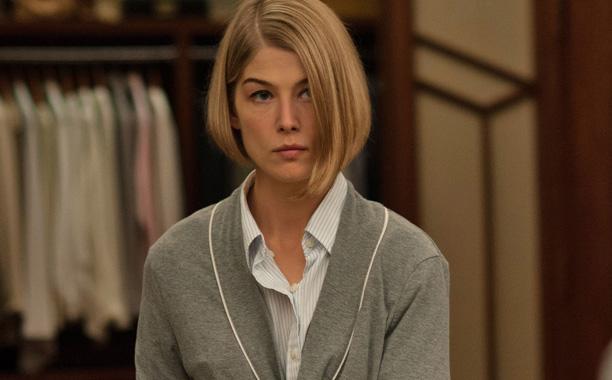
In effectively creating these characters, the real Amy demonstrates not only that she knows how to give people what they want and/or expect, but also that she has a certain disdain for a society that’s just as inauthentic as she is, if not more so. Especially in the act of removing herself from her unsatisfactory marriage with Nick, she embarks on “a withdrawal to the heights of moral disdain” for society.
This disdain is evident when she describes the “cool girl”: men’s “defining compliment” which refers to a woman who changes herself – or “acts” – in order to embody the fantasies of men. The implication is that a man’s “ideal” woman is one who does a convincing job of pretending to be whatever it is that he wants – in other words, the “ideal” woman is phony. The fact that Amy, by her own admission, plays the “cool girl” in the earlier days of her relationship with Nick, along with the other characters, underscores her willingness to present whichever “true” identity works to her advantage.
The ways Amy regards other women are interesting, as well. For one, she doesn’t seem to get along particularly well with Nick’s sister, Margo, as evidenced by the latter’s remarks that “whoever took [Amy] is bound to bring her back.” Another good example is the way Amy talks about the women she strategically “befriends”: She calls them “idiots” with “humdrum” lives, adding with particular venom that “America loves pregnant women, as if it’s so hard to spread your legs.”
Most interesting, perhaps, is the failure of Amy’s “Nancy” act when Greta and Jeff find out about her money. When Greta pushes Amy’s face against a wall, the blow demonstrates that Amy’s identity is “easier to see through than she thinks.” Also, since Greta is one of the few people who sees through Amy and is evidently dominant in her relationship with Jeff, Greta seems to be a kind of match to Amy – perhaps another skilled manipulator who recognizes her own qualities in others.
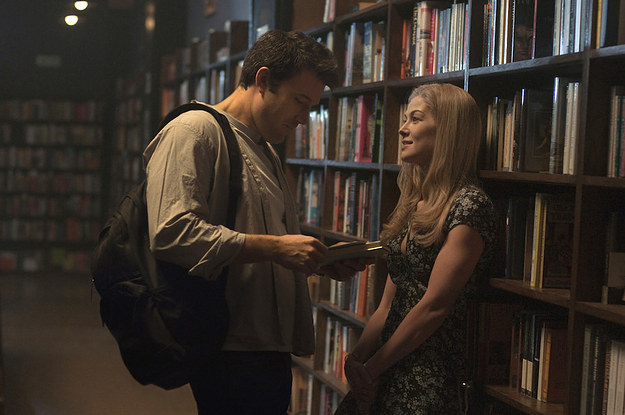
The Honeymoon’s Over
The controlling aspect of Amy’s personality is evident throughout her marriage to Nick, which not only is fraught with conditions, but also never seems to be “real.” Even the relationship’s “fairytale early days,” as Amy calls them, are characterized by Nick and Amy both pretending to be different people. While Amy plays the “cool girl,” she also seems to be largely at the helm of Nick’s “act,” since she “inspired him to rise to [her] level” and “forged the man of [her] dreams.”
This focus on “improvement,” even if only on a superficial level, echoes her parents and the Amazing Amy books: Everything “Amazing Amy” does in the stories is an “improved” version of something the real Amy does. For example, whenever Amy quit an activity or got cut from a team in childhood, “Amazing Amy” would become a prodigy or an MVP. This seems like a none-too-subtle way of Amy’s parents telling Amy the way she should be, and the success of the books suggests that society also endorses the “superiority” of “Amazing Amy.” As Nick says, Amy’s parents “plagiarized” her childhood – and worse, they “edited” it to make it worthy of public consumption, thus implying the inferiority of the real Amy’s experiences.
But in the same way that “Amazing Amy” is a work of fiction, Nick and Amy’s marriage is a sham, as it’s built mostly on disingenuousness. According to Amy, she and Nick were “the happiest couple [they] knew” while they were pretending to be other people; even if that’s true to a certain degree, it obviously isn’t sustainable, as it fails to get Nick and Amy through even five years of successful married life.
The fact that Nick drops his act – or “[gets] lazy,” as Amy puts it – suggests that he either grew tired of playing the part or was never fully sold on it in the first place, thus contradicting the mutual happiness Amy claims characterized their marriage. And Amy’s statement that Nick “actually expected [her] to love him unconditionally” may suggest that Nick has an interest in being valued for “the real him” – even if he’s not interested in reciprocating the sentiment, which is a distinct possibility, considering his dismissal of Amy as “complicated” and his general disregard for things he knows are important to her, such as the anniversary “treasure hunts.”
Ultimately, though, the marriage is hollow, marked most prominently by Nick and Amy’s reactions to its impending failure: Nick avoids and withdraws, using his failure to satisfy Amy as justification for his affair with Andie, and Amy closes in around Nick, changing her plan from a revenge plot to land Nick in prison to a trap to keep him bound to their marriage.
Dressing for Success
Like an actor dons a costume to play a character, it behooves an individual trying to “sell” a false identity to look the part – and although Nikolai and Amy are very different, they both go all out in terms of physical transformation. In Nikolai’s case, the primary method of physically transforming into a full vor is getting tattoos denoting criminal history, a highly prevalent practice in the world of Russian crime. Nikolai’s tattoos tell the story of a man who could realistically join the VvZ: The symbols serve as a “rap sheet” denoting the crimes he committed, the sentences he received for them, and the prisons where he served his time. The tattoos he has at the beginning of the narrative allow the committee to formally induct him into the VvZ, and the stars he gets on his chest and knees upon his induction allow the Chechen hit men to identify him as a vor in the bathhouse, and for him to confidently tell Scotland Yard that he is “through the door.”
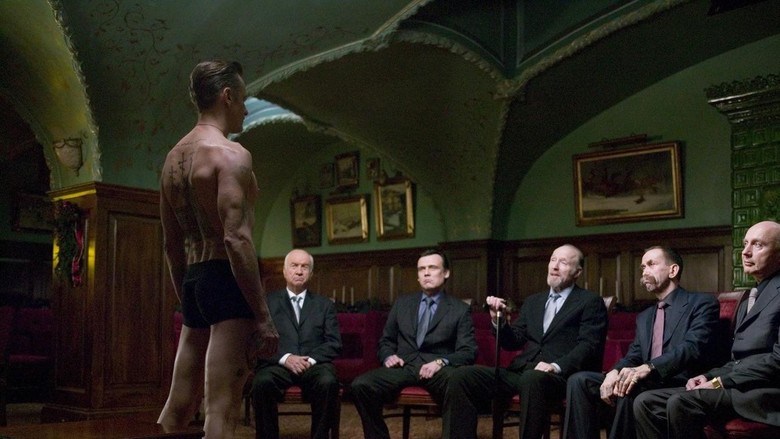
While Nikolai’s tattoos allow for his recognition, Amy’s physical transformation allows her to disappear. Before her disappearance, Amy is thin, blond, and manicured – “the perfect picture of late capitalist body maintenance.” However, she gains weight slowly over the months leading up to her disappearance, carefully disguising it with loose-fitting clothing. On the day she leaves, she stops at a gas station and finishes her “costume”: frumpy clothes, a pair of glasses, dye to cover her blond hair with a less noticeable shade of mouse-brown, and a bruise to the face, self-inflicted with a hammer and meant to look like evidence of a beating.

Amy goes to similar lengths for her next transformation by working ligature marks into her wrists and ankles and inflicting vaginal and/or anal trauma on herself with a wine bottle in order to achieve wounds that “are consistent with rape” to seal Desi’s “guilt” as her kidnapper and rapist upon her return to Nick.
Moving Up – or Down – in the World
There are also several important changes to roles and situations in both films. Nikolai, for one, goes from “chauffeur” to “undertaker” (or so Kirill says) to VvZ “king,” representing a considerable elevation in status. Also, his position as an undercover agent is itself indicative of some major life change, but very little is revealed about his past. He has the tattoos of an experienced Russian criminal, but it’s unclear how much of that illustrated history is actually true. He may be a gangster who decided to shift his loyalties to the government at some point, or he may be more agent than gangster, adding at least a few of the tattoos solely to help him look the part.
Another considerable shift of situations in Eastern Promises is the fate of Tatiana and the other girls held captive by the VvZ. These are poor girls from likely small villages in Eastern Europe who are told that “honest work” awaits them in London through a “family friend” who promises to make their dreams of finding a better life in the much-fabled Western world a reality. Tatiana, for example, is promised to “make more money in a week than her father makes in a year” while singing at a restaurant. But ultimately, the girls are trafficked and forced into sex slavery by the VvZ, in yet another undermining of the organization’s “family values.” So these girls do get a new life – but not a better one. While Tatiana literally goes from poor girl to sex slave, she emotionally goes from a person full of hope to one who laments that the nature of her confinement makes suicide impossible.
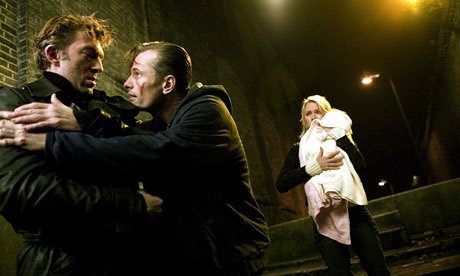
Tatiana’s baby, Christina, is another interesting case. Although “slaves give birth to slaves,” as Nikolai says, Christina is also a kind of “princess,” since Semyon is her father. She doesn’t seem to have a hopeful future at first, since her options are entering into foster care or living with the VvZ – if she even survives infancy, in light of Semyon’s interest in killing her. However, Nikolai’s interventions allow Anna to adopt Christina, thus granting Christina a transformation from slavery to a life with “nice people” – in other words, a chance at living some version of Tatiana’s dream.
Although perhaps not as drastic in a mortal sense, Nick and Amy also transform throughout Gone Girl. They go from successful media professionals living a life that “exudes excess” in New York to a pair of laid-off Recession casualties, broke and relegated to “the armpit of this great country,” as Amy puts it, to be close to Nick’s ailing mother. It is Amy’s elaborate scheme, however, that serves as the ultimate transformative act, propelling both her and Nick to instant fame as innocent victim and cold-blooded wife-killer, respectively. And upon Amy’s return, financial problems also seem to be behind them, as their new celebrity status grants them a book deal, a Lifetime movie, and multiple press opportunities. So professionally, they experience a full-on change of roles, transforming themselves from contributors to the media into celebrities covered by the media.
Most interesting, however, is the case of Nick and Amy’s marriage, which is irrevocably transformed – but not into something entirely different. The pre-disappearance marriage is a falsehood constructed by outside pressures – that is, Nick and Amy’s attempts to conform to society’s expectations of what a marriage between two people such as themselves should be. The post-disappearance marriage, on the other hand, is crafted from within, carefully designed to perpetuate the “Dunne marriage” that society wants to see in the wake of Amy’s ordeal. Both faces of the marriage are phony – they just have different rules.
First World Problems – and Promises
Ultimately, the characters within both Eastern Promises and Gone Girl live in worlds full of lies and contradictions in what could be seen as an intriguing comparison of the problems associated with the Developing World and those with the First World, respectively. While London is a First World, Western society, immigrants from Eastern Europe and other areas are not necessarily truly part of that society, even if they are residents of London. Mentally, immigrants tend to be “neither here (the country of adoption) nor there (their homeland), but in both places simultaneously.”
This is evidenced to a degree in Eastern Promises when the Eastern European immigrants gather in Semyon’s restaurant to enjoy Russian food and folk songs. They have made it to the West and are presumably living comfortably enough, and yet, the tastes and sounds of their homeland still hold a seemingly powerful sense of nostalgia, underscoring the fact that London will never be “home” to them in the same way as their birthplaces. This nostalgia can become homesickness for individuals in horrible situations, such as the VvZ’s captive girls. For example, when the girl chosen for Nikolai’s “examination” sings to herself, the longing for her native Ukraine seems apparent.
These dreams of a “better life” in the West are easy tools for exploitative labor practices routinely used by both native individuals and entities and other immigrants. For one, human trafficking is a global issue, portrayed in Eastern Promises as Russian gangsters and businessmen exploiting Eastern European girls who suffer from limited opportunities, gendered practices, and dreams of thriving in the West. London natives contribute to the situation in that they presumably contribute financially to the VvZ, even if unwittingly or indirectly, by visiting Semyon’s restaurant and/or “brothel,” thus enabling the organization’s existence.
In terms of voice and power, Amy represents a stark contrast to girls like Tatiana. While trafficked individuals tend to initially trust those who ultimately become their captors due to hope, naïveté, or a combination thereof, Amy is cunning, fueled by an intense desire to get what she wants. Although Amy isn’t a trafficker, she’s an exploiter of a similar sort in that she openly uses people like Desi and her neighbor, Noelle, with little to no regard for their welfare. Also like a trafficker, Amy works the system to her advantage by casting herself as a victim – first of Nick, then of Desi. The fact that true victims of sexually oriented crimes, like Tatiana, have no voice at all, while a phony “victim” has not only a voice, but millions of sympathetic listeners and fans is very telling.
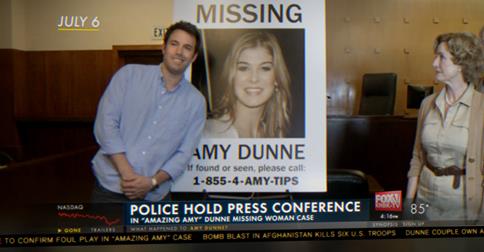
A Little Spin Goes a Long Way
The ultimate enabler for Amy is the U.S. media, which turns into a full-blown frenzy upon Amy’s disappearance, as the networks salivate over the ratings potential of the case. The pretty, blond subject of the once-popular Amazing Amy books going missing under suspicious circumstances is a story that sells, and gets even juicier with the news of Amy’s “pregnancy,” Nick’s questionable media presence (i.e. smiling broadly for the cameras at a “Find Amy” fundraiser), and Nick’s affair with the much-younger Andie. The round-the-clock media coverage of the story is similar to the real-life media coverage devoted to the high-profile murder cases of Casey Anthony, O. J. Simpson, and especially Scott Peterson, who may well have served as a model for the character of Nick.
And media slant makes an important difference. Consider the two main hosts in Gone Girl, for example: Ellen Abbott and Sharon Schieber. Abbott, who appears to be modeled at least in part on real-life host Nancy Grace, quickly assumes not only that Amy is dead, but also that Nick is guilty of killing her. She interviews various people about Nick and his perceived (lack of) character, insinuating not only that he killed Amy, but that he has an incestuous relationship with Margo and a disregard for his father’s health. She doesn’t give Nick a voice until after Amy returns and “clears” his name.

Schieber, on the other hand, arranges an interview with Nick, allowing him to speak for himself when he’s at a public opinion low following Andie’s announcement of their affair. Public opinion, while hardly binding in a court of law, is powerful, leading even Officer Gilpin to write off Nick as Amy’s killer essentially from the beginning of the investigation. Notably, Gilpin also informs Detective Boney that his wife says Nick is the killer, like that has a legitimate bearing on the case.
Given the media circus, it’s not surprising that Tanner Bolt approaches Nick’s case more as a stage manager than a lawyer, coaching him like a “trained monkey” to fight back against the negative press and to try to shift Amy’s public image from “America’s sweetheart” to, as Bolt puts it, “a mind fuckup of the first degree.” What is theoretically a collection of impartial news media outlets reporting on a citizen facing potential legal action is, in truth, a game full of peddlers and actors, all trying to manipulate the audience to their advantage. As Bolt says, the case is about not so much learning who killed Amy, but what the public thinks of Nick.

Interestingly, the news media may be simultaneously the least authentic and the most potentially beneficial element across both Gone Girl and Eastern Promises. It’s phony in the sense that it’s really driven by ratings rather than its purported goal of telling the truth. Also, like the real news media of the twenty-first century, it includes multiple, often disparate, voices and slants, which makes it difficult for the public to really know the truth. And, tellingly, coverage of issues is not equal. Sex slavery, human trafficking, and the issues covered in Eastern Promises are unlikely to get round-the-clock coverage via American news media any time soon. The media provides voices to many individuals and entities, and yet, girls like Tatiana remain largely voiceless. Still, the media has the power to change lives overnight, as evidenced by Nick and Amy’s instant celebrity and financial opportunities following Amy’s return.
Dreams and Disillusionment
Finally, though, while Eastern Promises and Gone Girl are worlds apart, they connect in that their main characters identify themselves, at least in part, according to their dreams and a search for something better. Tatiana and girls like her have dreams of the opportunities they could enjoy in the West, only to be faced with the harsh reality of disillusionment and exploitation. Anna has dreams of becoming a mother, and finds that she has the opportunity to live this dream by adopting Christina. Nikolai may have dreams, on some level, of living a “normal life,” only to find himself sitting alone, settling into the lonely life not only of a vor, but of a double agent.
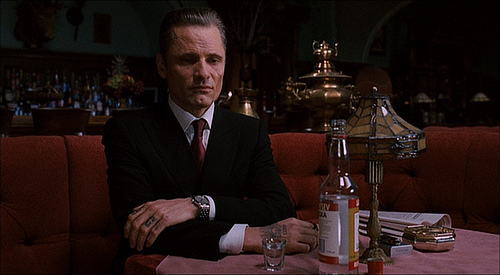
Amy seems to have dreams of being part of the “perfect” marriage, taking drastic action to force success when faced with impending defeat. And Nick seems to develop a dream of clearing his name following his media lynching – a dream Amy brings to life, albeit with a host of conditions. While these dreams differ considerably in both nature and outcome, just as the films themselves, they all ultimately boil down to the inherently human quality of working towards the creation of new identities in the search for a better life.
Works Cited
Bordwell, David. “Gone Grrrl.” David Bordwell’s Website on Cinema 21 October 2014. n. pag. Web. 21 April 2016.
Eastern Promises. Dir. David Cronenberg. Perf. Viggo Mortensen, Naomi Watts, Armin Mueller-Stahl, and Vincent Cassel. BBC Films, Astral Media, Kudos Pictures, Corus Entertainment, Telefilm Canada, Serendipity Point Films, and Scion Films, 2007. Film.
Galioto, Erica D. “‘One Long Frightening Climax’: Gillian Flynn’s Gone Girl and Lacan’s The Other Side of Psychoanalysis.” E-rea: Revue d’etudes Anglophones, Vol. 12, No. 1. (2014): n. pag. Web. 20 April 2016.
Gone Girl. Dir. David Fincher. Perf. Ben Affleck, Rosamund Pike, Neil Patrick Harris, and Tyler Perry. Regency Enterprises and TSG Entertainment, 2014. Film.
Kim, Min-Sun, et al. “‘Deception, Moral Transgression, or Necessity?’: Cultural-Relativity of Deception Motivations and Perceptions of Deceptive Communication.” Journal of International and Intercultural Communication, Vol. 1, No. 1. (2008): 23-50. Web. 20 April 2016.
Kligman, Gail, and Stephanie Limonceli. “Trafficking Women After Socialism: To, Through, and from Eastern Europe.” International Studies in Gender, State, and Society, Vol. 12, No. 1. (2005): 118-140. Web. 20 April 2016.
Lowenstein, Adam. “Promises of Violence: David Cronenberg on Globalized Geopolitics.” Boundary 2, Vol. 36, No. 2. (2009): 199-208. Web. 20 April 2016.
Moseley, Daniel. “Self-Creation, Identity, and Authenticity: A Study of A History of Violence and Eastern Promises.” The Philosophy of David Cronenberg. Ed. Simon Riches. Lexington, Kentucky: The University Press of Kentucky, 2012. eBook. 20 April 2016.
Peary, Gerald. ed. David Fincher: Interviews. Jackson, Mississippi: University Press of Mississippi, 2014. eBook.
Riches, Simon, ed. The Philosophy of David Cronenberg. Lexington, Kentucky: The University Press of Kentucky, 2012. eBook. 20 April 2016.
Rodriguez Ortega, Vicente. “Surgical Passports, the EU, and Dirty Pretty Things: Rethinking European Identity Through Popular Cinema.” Studies in European Cinema, Vol. 8, No. 1. (2011): 21-30. Web. 20 April 2016.
What do you think? Leave a comment.











The thing about Eastern Promises that I liked is the fact that visibly, there’s not a single gun used in the movie. Even without guns, Cronenberg still managed to make it awesome.
Yeah, I’ve read that Cronenberg chose not to include guns because he learned that the Vory v Zakone is more into knives. A lack of guns is very unusual for a film of this genre, but I agree that it works really well.
I’d like to see Cronenberg make films ala-Videodrome or The Fly again (although I am super satisfied on how he is now, I just somehow miss it).
Yeah, I know what you mean. I really like Cronenberg’s more recent work, too, but his older “body horror” stuff is a lot of fun. Very different feels.
This is a great analysis, almost quasi-Gnostic.
Thank you!
Am I the only one to think that ‘Gone Girl’ has suspiciously many similarities with the 1995 film ‘To Die For’ (with a really mesmerizing Nicole Kidman in the main role)? ‘To Die For’ was gripping from the start, all the characters fully developed and the acting superb – what is, in my view, not the case for ‘Gone Girl’.
Oh yeah, To Die For is great. I didn’t initially make that connection, probably because To Die For has always struck me as a dark comedy, whereas Gone Girl seems to be more of a serious dramatic mystery. But now that you mention it, I can definitely see some similarities.
I’m going to watch both movies and get back to you.
Bizarre. I have watched both films and they are comfortably some of the worst, most ridiculous films I have ever seen. Up there with The Happening. It was so bad it started to become enjoyable again, just for all the wrong reasons…
LOL, yeah, The Happening is pretty bad (assuming you mean the one from ’08 with Mark Wahlberg).
Rosamund Pike was mesmerising.
Yeah, I think Rosamund Pike did a great job. I read somewhere that Reese Witherspoon was briefly considered for the role … I have nothing against her, but I’m really glad that didn’t happen.
Amazing article. Sent this to all my friends. I loved that part of Gone Girl and you captured its essence beautifully.
Thank you so much!
I’ve gone through a lot of Cronenberg since I was a little kid. I practically grew up with his films like Scanners, The Fly, M. Butterfly. To me, he has never made a bad film.
Same here. The first of his films I remember seeing was The Brood. I was about 11, but I convinced my dad to let me rent it (this was back when Blockbuster was still a thing). My mom was *furious* when she found out, LOL. Good times.
brilliant and totally entertaining gone girl is, I think the movie still lacks a more developed exploration of her rich new york family, the slick devil of social conventions – Instead another satyre directed at mass/social media. And the ending seems somewhat complicated as some sides of his character remain under-explored. Anyway, great movie.
Agreed. I really enjoyed all of that detail in the book, especially the parts about the media field pre- and post-Recession. It would be difficult to truly capture *all* of that in a film, but I think this was a good effort.
I thought Gone Girl was poor. It was quite one-dimensional and trivial, and at no point in the film was there a twist or a eureka moment. It cast very little light on social, political, or relationship issues. Affleck raised the occasional laugh, but the rest was all rather flat.
I thought the film had a nice, quietly tense atmosphere throughout, and I really enjoyed that. But yeah, the book definitely has more detail.
I didn’t like the book but stuck with it even though the writing gave me the urge to flick through pages.
I enjoy reading this piece as you dissected both GREAT movies.
Thank you!
Viggo Mortensen is something like an acting god. This is such a stunning, terrifying performance.
Yeah, he’s great. I think he’s at his best with Cronenberg.
Really disliked Gone Girl novel. Nick’s dialogue is completely unbelievable and the ending of the book is a bit ridiculous.
I know what you mean about the ending. I actually saw the film before I read the book, but I remember thinking initially that the ending seemed a little far-fetched. It’s grown on me more with subsequent viewings.
i’m one of those who thought that Amy was not psychotic or at least she was not just that .I believe that she was the gone girl but not only because she disappeared but also because she erased herself to become the girl that Nick would like .Maybe she was always obsessed with showing the best version of herself , as she was Amazing Amy from a really young age.I think that Nick tried to take advantage of her financially and was jealous of her great mind so he felt better ignoring her desires and trying to underestimate her.Apparently ,he was wrong .She is capable of everything and that’s what’s so interesting about her . I can see that she wanted justice and she was willing to do everything in order to get it . I can’t deny that she was too harsh on him but Nick took and took from her until she no longer existed .You don’t mess with women like Amy , silly Nick.
I think Amy definitely has some psychological issues, but I don’t think she’s actually psychotic. Diagnosis aside, though, I think she’s a great character. Very interesting.
Regarding Eastern Promises, what I can’t get is the persistency with which so many well-esteemed directors keep on invading the territory of national specifics, totally unknown to them. Russians, Persians, Chinese… Gangsters are the same everywhere. The story doesn’t really depend on their ancestry. Let them be Irish or Scotts if you want some regional touch. But no, we’ll hire a fancy consultant and sure make this right this time… Ok, good luck.
I understand the desire to look to other nations and cultures for new material, settings, etc., but I see what you mean. One related thing I notice a lot has to do with language: For example, an American film will be set in France and consist of French characters, but the cast will all speak English with a French(ish) accent. This is, of course, not exclusive to an American-French dynamic, but it seems to be a very common practice within predominantly English-speaking countries. I haven’t done the research, but off the top of my head, I suspect this is popular because general audiences in places like the States don’t like to read subtitles. Also, most of the actors who can get people into theaters in these countries may not be able to speak the languages in question.
I saw Gone Girl twice before reading the novel and I found that both the film and the book leave you wondering if everything we know about Amy (and her distinct personas) was all an act. I believe the ambiguity is much more interesting than a definitive answer.
It seems realistic for Amy to project her self-loathing onto other women since she recognizes something about them that she dislikes within herself. Also, the “cool girl” passage is one of the most memorable and telling lines in the book. Glad to see it referenced in your article! Very interesting read!
Thanks! Yeah, I really enjoyed the “cool girl” detail in the book, and I’m glad they included at least a bit of it in the film. Crazy as it is, I think there’s actually quite a bit of truth in it, LOL.
I’ve known 2 diagnosed Borderline personalities in my life and, believe me, you don’t want to get sucked up into their vortex; you will doubt your own sanity. One ended up committing suicide and the other is almost a hermit now. Both are/were in therapy most of their lives, but it’s a very difficult condition to treat from what I understand. As with any mental illness your heart goes out to them, but at the same time all you want to do is escape.
I love Gone Girl, and the one thing that I liked about Eastern Promises is how it is subtly made without breaking into the usual action/violence flick. its controlled in a manner that makes the viewer think for himself.